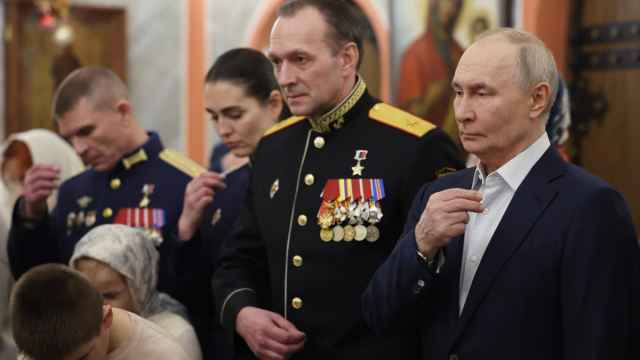A gasoline crunch may persist throughout the summer driving season as refiners lack the capacity to replenish tight supplies, even after prohibitive new tariffs slowed exports of the fuel.
Traders said lines at gasoline stations would lengthen and some stations could close for good as the wholesale market — which supplies gasoline station networks independent of Russia's major oil producers and refiners — had all but seized up.
"Domestic deliveries are attractive again because of the duty, but unfortunately it can't put gasoline back on the market and eliminate the huge deficit that built up over two months," one oil trader said.
The fuel shortages stem in large part from an order back in February by Prime Minister Vladimir Putin to oil firms to cap pump prices, which encouraged refiners to export products as prices rallied on international markets.
Many of Russia's refiners were also unable to meet tighter emissions standards imposed from Jan. 1, which forced them to sell barrels that didn't meet the standard on foreign markets. Seasonal maintenance at refineries has also played a role.
Putin's government responded to the supply crunch by hiking gasoline duties by 44 percent from May 1 to $408 per ton to keep more fuel on the domestic market. Putin went on to accuse oil firms of colluding in a price-fixing "conspiracy."
Higher export duties alone will not solve Russia's fuel crisis, however. Much of the gasoline that has been exported has been low-quality Euro 2 grade, which has been banned from Russia's gasoline pool under the new emissions standards.
A solution is more likely to be found in an effective repeal of the tighter emissions standards.
The deficit at the pumps coincides with the start of the dacha season, when city dwellers across the country drive out to their country cottages, where low-income families in particular spend holidays and raise vegetables to save money.
Wholesale prices per ton of 92-RON gasoline have hit 29,000 rubles ($970), exceeding their 2008 record of 27,000 rubles. High prices, however, are unlikely to dent dacha-related demand, which starts to rise in earnest in early May.
Data from past years show that Russian motorists burn 95 percent of gasoline output in the peak driving months from May to October.
The shortfall is difficult to calculate, but in the first three months of the year Russia exported 600,000 tons more gasoline than it did a year earlier, for a total of about 2.1 million tons. Production was flat at 8.8 million tons.
The price controls crushed Russian refinery margins, once some of the world's highest. Rosneft, Russia's largest oil firm, lost 70 cents on each barrel it refined in March, down from a profit of $5.10 in February.
Inventories have fallen to minimal levels over the past few weeks, while refiners have the capacity to supply just enough gasoline to cover consumption in the summer. That bodes ill for the rest of the season, suggesting that there is little chance to rebuild decimated stocks.
Refiners were offering no fuel to the market by the end of last week, and some had not even bothered to mark up their wholesale prices in line with price talk.
One trader said Russia's biggest oil firms were seeking fuel on the market to supply their own retail networks.
"The marketing units of the oil companies, for example Rosneft, LUKoil and TNK-BP, are going to the dealers to request gasoline," another trader said.
Russia's oil export duty may rise by about 2.5 percent in June to reach $463 to $466.50 per ton, the highest level in almost three years on surging crude prices, according to Finance Ministry and Reuters calculations Wednesday.
A Message from The Moscow Times:
Dear readers,
We are facing unprecedented challenges. Russia's Prosecutor General's Office has designated The Moscow Times as an "undesirable" organization, criminalizing our work and putting our staff at risk of prosecution. This follows our earlier unjust labeling as a "foreign agent."
These actions are direct attempts to silence independent journalism in Russia. The authorities claim our work "discredits the decisions of the Russian leadership." We see things differently: we strive to provide accurate, unbiased reporting on Russia.
We, the journalists of The Moscow Times, refuse to be silenced. But to continue our work, we need your help.
Your support, no matter how small, makes a world of difference. If you can, please support us monthly starting from just $2. It's quick to set up, and every contribution makes a significant impact.
By supporting The Moscow Times, you're defending open, independent journalism in the face of repression. Thank you for standing with us.
Remind me later.





